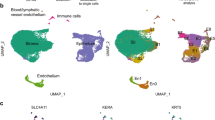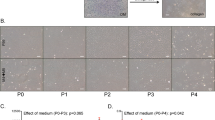Abstract
Keratinocytes of three different epithelia grown in cell culture express a large number of differentiation markers with either no differences or relatively small differences, depending on the species. Much of the distinctive phenotype of these epithelia in vivo must be due to external modulation and relatively little, at least in the case of the human, to permanent intrinsic divergence during development.
This is a preview of subscription content, access via your institution
Access options
Subscribe to this journal
Receive 51 print issues and online access
$199.00 per year
only $3.90 per issue
Buy this article
- Purchase on Springer Link
- Instant access to full article PDF
Prices may be subject to local taxes which are calculated during checkout
Similar content being viewed by others
References
Rheinwald, J. G. & Green, H. Cell 6, 331–344 (1975).
Rheinwald, J. G. & Green, H. Nature 265, 421–424 (1977).
Sun, T.-T. & Green, H. Cell 9, 511–521 (1976).
Rice, R. H. & Green, H. Cell 11, 417–422 (1977).
Green, H. Cell 11, 405–415 (1977).
Allman, M. I. et al. Invest. Ophthal. 15, 666–668 (1976).
Newsome, D. A., Takasugi, M., Kenyon, K. R., Start, W. F. & Opelz, G. Invest. Ophthal. 13, 23–32 (1974).
Yanoff, M. Documenta ophth. 41, 157–204 (1976).
Cohen, S., Carpenter, G. & Lembach, K. J. in Advances in Metabolic Disorders, 8 (ed. Lust, R. & Hall, K.) 265–284 (Academic, New York, 1975).
Savage, C. F., Jr & Cohen, S. Expl Eye Res. 15, 361–366 (1973).
Steinert, P. M. Biochem. J. 149, 39–48 (1975).
Baden, H. P., Lee, L. D. Kubilus, J. J. invest. Derm. 67, 573–576 (1976).
Yardley, H. J. & Goldstein, D. J. Br. J. Derm. 95, 621–626 (1976).
Billingham, R. E. & Silvers, W. K. J. exp. Med. 125, 429–446 (1967).
Sengel, P. Marphogenesis of Skin (Cambridge University Press, Cambridge, 1976).
Van Scott, E. J. & Reinertson, R. P. J. invest. Derm. 36, 109–131 (1961).
Goldberg, B. Cell 11, 169–172 (1977).
Todaro, G. J. & Green, H. J. Cell Biol. 17, 299–313 (1963).
Rheinwald, J. G. & Green, H. Cell 6, 317–330 (1975).
Yen, S.-H., Dahl, D., Schachner, M. & Shelanski, M. L. Proc. natn. Acad. Sci. U.S.A. 73, 529–533 (1976).
Author information
Authors and Affiliations
Rights and permissions
About this article
Cite this article
Sun, TT., Green, H. Cultured epithelial cells of cornea, conjunctiva and skin: absence of marked intrinsic divergence of their differentiated states. Nature 269, 489–493 (1977). https://doi.org/10.1038/269489a0
Received:
Accepted:
Published:
Issue Date:
DOI: https://doi.org/10.1038/269489a0
This article is cited by
-
Recent developments in regenerative ophthalmology
Science China Life Sciences (2020)
-
Mesenchymal stem cells improve healing of the cornea after alkali injury
Graefe's Archive for Clinical and Experimental Ophthalmology (2015)
-
Vimentin is necessary for colony growth of human diploid keratinocytes
Histochemistry and Cell Biology (2015)
-
Topical Brazilian propolis improves corneal wound healing and inflammation in rats following alkali burns
BMC Complementary and Alternative Medicine (2013)
-
Benzalkonium chloride breaks down conjunctival immunological tolerance in a murine model
Mucosal Immunology (2013)
Comments
By submitting a comment you agree to abide by our Terms and Community Guidelines. If you find something abusive or that does not comply with our terms or guidelines please flag it as inappropriate.



